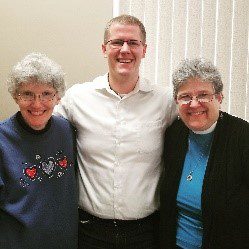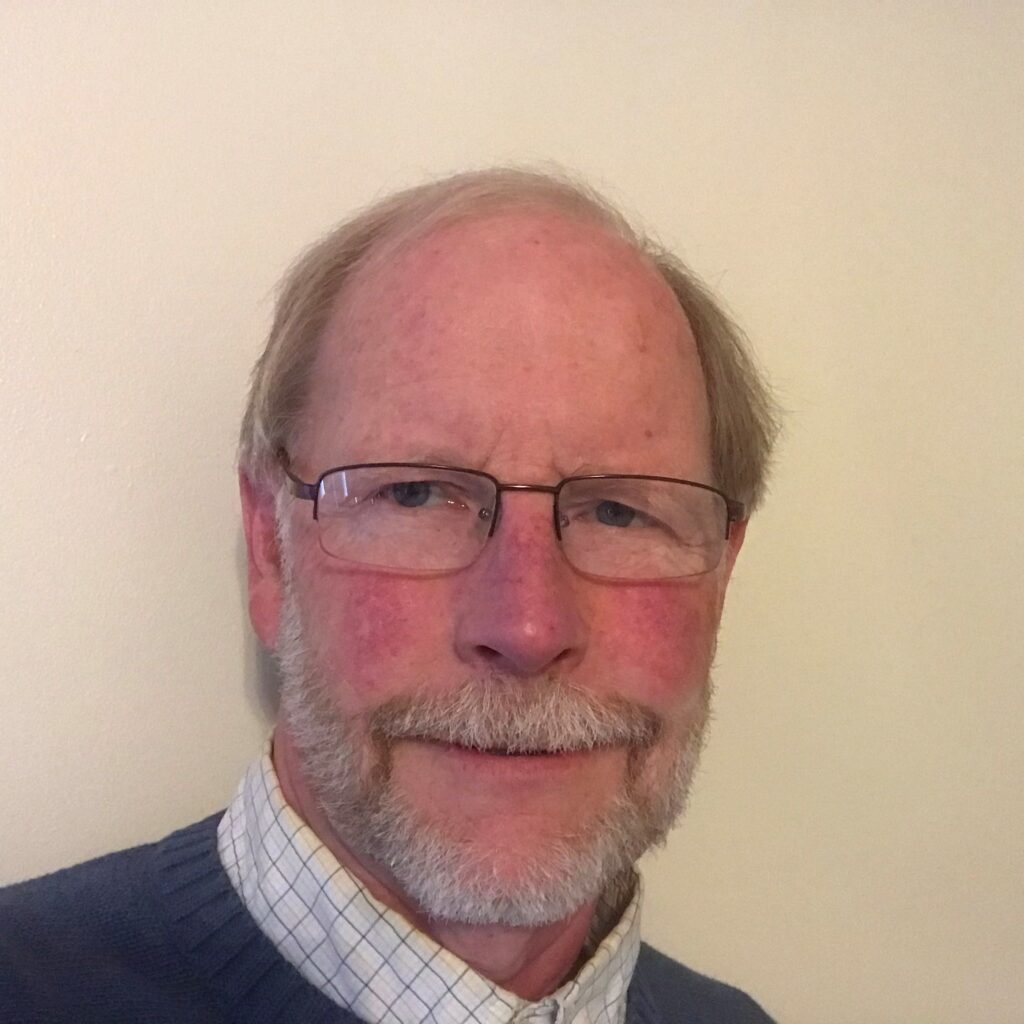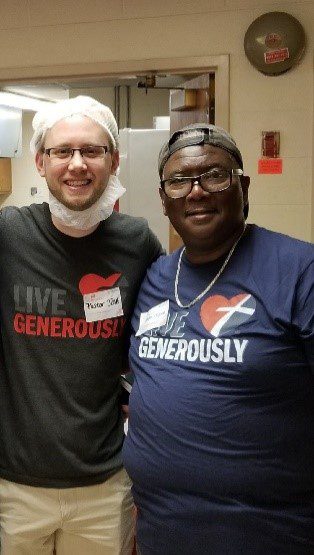Lutherans from across the Commonwealth spoke up for the hungry, the sick and the health of our common home as they met with their lawmakers in Harrisburg on May 27. Advocates urged their lawmakers to oppose two bills that would impose costly and cumbersome work requirements on those seeking Medicaid or food assistance. They also expressed concerns about proposed rollbacks of significant environmental regulations and encouraged support of protections for our air, land and water.
House bills 1659 and 2138 would hurt those already struggling to make ends meet by adding strict work requirements to receive the benefits of the Supplemental Nutrition Assistance Program (SNAP) and Medicaid. Most non-disabled adults who receive SNAP and Medicaid benefits already work, or need healthcare assistance and SNAP to make ends meet between jobs. Others with significant barriers to work will only face greater challenges if they lack adequate healthcare and nutrition. Learn more and act to prevent these costly and burdensome barriers to food and medical assistance.
Advocates also pressed for protections to our common home through sound environmental policy. Of particular concern is HB2154, on which the Senate is poised to vote. Already passed by the House, HB2154 would significantly change the environmental requirements for conventional oil and gas drilling operators, putting clean air and water in jeopardy. It would turn back the clock on standards by 34 years, rejecting new technology and weakening public health regulations in favor of profits for polluters . Learn more and act here.
The legislative visits followed remarks by keynote speaker Dr. Richard Alley, Evan Pugh Professor of Geosciences and an Associate of the Earth and Environmental Systems Institute at Penn State, where he holds the Faculty Scholar Medal. A member of the National Academy of Sciences, he was a member of the Intergovernmental Panel on Climate Change, which received the 2007 Nobel Peace Prize.
Powering the Planet: The potential of constantly-renewing resources, and what we can do right now. In the context of bipartisan legislation proposed in both Pennsylvania houses (with similar proposals at the federal level), Dr. Richard Alley used physics (and some humor) to give legislators, aides, and attending citizens of faith an eye-opening look at some of the country’s and the world’s most important case studies in smart energy decisions. He gave an assessment of what it takes to build a sustainable energy infrastructure, and share what’s possible right now, including in energy storage, which is so vital to expanding our use of intermittent energy sources like sun and wind. Advocates left inspired to #CovenantwiththeFuture and work toward practices and policies that support a transition toward 100 percent renewable energy by 2050. Read more about the legislation.
The day began at Trinity Lutheran Church in Camp Hill with worship and workshops on a variety of issues — from hunger to education, health care, environmental justice and criminal justice reform. There, LAMPa also celebrated advocates from around the state. The following shared inspiring stories of the Holy Spirit at work in our synods:
Allegheny Synod — The Rev. John Telyea, Geeseytown Newry Lutheran Parish
 How would you feel if you went to church and was the only person to speak your language? Think about the challenges you would face. How would you communicate with people? How could you be involved in church activities? For people who are deaf, and hard-of-hearing, this is an ever-present struggle. The ELCA has over 9,000 churches, but only seven use American Sign Language as their primary language. Sadly, studies have shown that only 1% of all deaf people regularly attend church. My hope, through the power of God’s Spirit, is to change those statistics.
How would you feel if you went to church and was the only person to speak your language? Think about the challenges you would face. How would you communicate with people? How could you be involved in church activities? For people who are deaf, and hard-of-hearing, this is an ever-present struggle. The ELCA has over 9,000 churches, but only seven use American Sign Language as their primary language. Sadly, studies have shown that only 1% of all deaf people regularly attend church. My hope, through the power of God’s Spirit, is to change those statistics.
My passion for deaf ministry, and raising leaders from the deaf community, began as I attended seminary in St. Paul, Minnesota. I was connected with Bread of Life Deaf Lutheran Church (BOLD) and Dorothy Sparks (the only deaf Deacon in the ELCA). It was at BOLD where I saw the Gospel of Christ in sign language for the very first time. This experience changed my life. I saw the many gifts that the deaf community has for the hearing church. I saw the leaders of BOLD, and their passion for ministry, reaching out to the hearing community to proclaim Christ.
Now, I continue God’s ministry in Altoona, Pennsylvania. My hope is to build bridges between the deaf and hearing communities. I am excited to say we are slowly doing that through monthly events and a bilingual bible study. I pray for God to continue to bless our ministry.
Lower Susquehanna Synod — Sister Dottie Almoney, St. Peter’s Lutheran Church, Lancaster
The opening lines of our Deaconess Motto states:
I wish to serve…The Lord, in His poor and Needy ones….I do not serve for reward or thanks, but out of gratitude and love; my reward is that I may do this….
As one who is a member of the Diaconate, I am called to serve those on the margins; to bridge the church and the world. As a Deaconess of the ELCA, I am part of a sisterhood that is called to impact a broken world. One way that I carry out my call is through Advocacy. I have been advocating for several years for our children and youth to have a safe place at our churches through becoming a safe church trainer and advocate. I became involved in advocating for a fair budget at the Pennsylvania Capitol, as well as speaking out for peace and justice for Israel and Palestine, through Christians for Middle East Peace. After a ministerium meeting with our school social worker, we began working with other local churches to create Lydia’s Closet – a clothing bank aimed at children and youth who need school clothing, school supplies, and toiletries. I also write diligently to my congressmen voicing my concerns on how we treat the most vulnerable in our society and advocate for just legislation.
I believe that education is essential to highlight the social injustices in our communities, our states, nation, and the world. As chair of the global missions committee, during our 2017 Synod Assembly we offered a workshop on immigration, human sex trafficking, and welcoming our neighbors.
Part of educating our congregation has included writing curriculum for our youth and adults on immigration and the Biblical Story, racism, and the history of anti-Semitism as well as hosting several dialogue sessions for intergenerational discussions on advocacy and the church. I believe it is important that we encourage our youth to not only vote, but to vote through a “gospel lens.” I recently attended the annual Ecumenical advocacy days in Washington, D.C., and want to continue to learn new strategies in which to advocate for those in the margins. I am grateful to LAMPA for their support in my advocacy ministry.
Northwestern Pennsylvania Synod — Dennis Groce, St. Peter’s, North East
 Dennis and his wife, Marcia, live in North East, PA (Erie County) where they are members of St. Peter’s Evangelical Lutheran. Dennis and Marcia have two adult sons.
Dennis and his wife, Marcia, live in North East, PA (Erie County) where they are members of St. Peter’s Evangelical Lutheran. Dennis and Marcia have two adult sons.
Dennis has degrees in civil engineering, public health, and industrial/management systems engineering. He worked most of his career (30 years) for the U.S. Centers for Disease Control and Prevention in Morgantown, West Virginia. During that time, he was part of research for improved worker health and safety, with most work being related to respiratory health of miners and farmers. After retirement in 2001, he worked for several years as a consultant to CDC on projects regarding the health of construction workers and agricultural workers. From 2006 – 2016 Dennis and Marcia operated a bed and breakfast as well as vacation rental in part of their home.
While working in West Virginia, Dennis helped form the WV Interfaith Global Climate Change Campaign. Since moving to North East in 2006, Dennis has been active in several congregational areas as well as the NWPA Synod Hunger Committee and the recently formed NWPA Synod Green Team. He has:
- helped raise awareness within the synod of climate change and its potential effect on hunger;
- worked with others in organizing an interdenominational environmental workshop in Erie;
- developed several forums at NWPA synod assemblies;
- drafted earth care-related resolutions for NWPA synod assemblies;
- given testimony at an Environmental Protection Agency public hearing regarding a proposed rule to limit carbon emissions from existing power plants.
The biggest influences in Dennis’ life have been faith, family, friends.
Southeastern Pennsylvania Synod — The Rev. Dwight Mason and the Rev. Joshua Ferris, Holy Trinity, Narbeth, and Grace, Philadelphia
 Holy Trinity Lutheran Church in Narberth and Grace Lutheran Church in Philadelphia have been “Sister Churches” for decades.
Holy Trinity Lutheran Church in Narberth and Grace Lutheran Church in Philadelphia have been “Sister Churches” for decades.
Over the years, both churches have been honored to partner in various food ministries. Grace being an example of getting outside of the four walls of their church and feeding numerous families at their weekly Food Bank and Holy Trinity being thankful that Grace needed extra resources to support their mission. We have shared and celebrated multiple occasions from Installations, Ordinations and even a Baby Shower. Through comradery and the Holy Spirit, we realized that a black urban church and a white suburban church had a bigger food outreach mission in store.
In October 2015, Holy Trinity partnered with Grace Lutheran to package 21,358 meals- all of which were used to feed people through Grace’s food ministry in West Philadelphia. We were blessed to have over 90 volunteers from both churches come together for service and fellowship. Again, in October 2016 we packed another 20,000 with 100 volunteers and now our yearly tradition, with faith and love has continued, on October 2017 we packaged 20,000 plus meals with 100 plus volunteers.
Our work does not stop there. Grace continues to feed 2000 people a month and Holy Trinity continues to provide turkeys for the holidays, canned goods and fresh vegetables from their “Giving Garden” during the growing season. Clothing is collected to support “Gracey’s”, where clothes and household items are available to the West Philadelphia community and operated by Grace’s congregation.
Grace Lutheran and Holy Trinity will continue to work equally in different capacities to fulfill God’s word. We are truly blessed to have this partnership.
“Blessed are you who are hungry now, for you will be filled.” (Luke 6:21)
Southwestern Pennsylvania Synod — The Rev. Ross Carmichael

As the text of Leviticus reminds me, my story – my family’s story, my faith story – is an immigrant story. As simple as it may seem, I see ministry of advocacy and accompaniment as my response to Christ’s call to love our neighbors, including the immigrant who resides among us, experiencing many of the same struggles my ancestors did.
My passion for this work took root during my seminary internship at Phinney Ridge Lutheran Church in Seattle, Washington, where I had the opportunity to work with a community of Indonesian Lutherans from the Huria Kristen Batak Protestan (HKBP) church in the area. People of the congregation and community were living in fear, being prioritized for deportation in the year following 9/11 simply for being from a majority-Muslim nation. Being invited to listen to the people’s stories, pray with them, and walk with them to court and in the streets was a powerful experience. In the years following, I have learned much about the unwieldiness of the U.S. immigration system, and what I consider to be its injustices.
I have served as pastor to people who have taken great risks in coming to this country, not feeling as if they had any other option – people who may not meet the standard definition of “refugee,” but who nonetheless come fleeing difficult and often dire circumstances beyond our imagination. In my ministry I have been blessed to walk with people from India, Mexico, Central American, and Caribbean countries as they seek to establish a life in the U.S., provide for their families, and avoid deportation, even though they present no danger to others but instead live and serve as responsible neighbors in their communities. I feel called to utilize whatever privilege I may have by accident/coincidence of birth to care for the stranger and advocate on behalf of our vulnerable neighbors, God’s people.
Upper Susquehanna Synod — The Rev. Dr. Kerry Aucker, St. John, Jersey Shore

Since October 1, 2014, when I volunteered our church to host the food pantry after the previous organization closed, we have been actively engaged in feeding the hungry in our large rural area of northcentral Pennsylvania. While statewide the number of children 0-18 years of age is 36 percent, in our area the percentage is 26 percent because young people leave the area due to a lack of employment opportunities. Unemployment, underemployment, health issues, and a lack of work skills are a reality in this area. On the other side of the curve, the number of seniors seeking food assistance continues to grow. The New Love Center also provides senior boxes and that number has grown to 100 boxes per month. Statewide, one in six children are food insecure. In Clinton County one in four children are food insecure and in Lycoming County one in five children. We initiated the backpack program in the schools, and that program has exploded. We started off last January with 32 children enrolled in the program and now we are delivering 175 backpacks to the schools every Friday. In addition, we stock tubs in every school, including the high school, with granola bars and other snacks, to provide something for students to eat who may come to school hungry or will go home with nothing available to eat.
As a pastor, I have the privilege to hear the stories of people who worked hard all their lives but never made big money and never had pensions. These are “salt of the earth people” who live from social security check to social security check. They are very appreciative of the box of food, milk, eggs, produce and vegetables I can obtain from the Central Pennsylvania Food Bank and other sources each month. In addition, I have written and received grants for the homeless in our area — people who live in their cars, at the local campground, in the forest above town, and under our bridges, who lost their homes due to unemployment, drugs, medical issues, etc. I have climbed under the bridges to reach out to these people and delivered our “grace bags” assembled by the youth of St. John Lutheran for “the least of these.” I have advocated for the poor and hungry by advocacy for hunger relief efforts here in Pennsylvania. When the gas industry boomed six years ago, a local trailer park was sold so that the space could be used for a water pumping station. I rallied the members of St. John Lutheran who helped the residents move their belongings to new residences. While advocacy may involve writing letters and making phone calls, sometimes it also means getting physically involved and reaching out to those in need by feeding the hungry, sheltering the homeless, and sharing hope with those in crisis. The members of St. John Lutheran have been wonderful in their efforts and I am proud to serve as their pastor.





